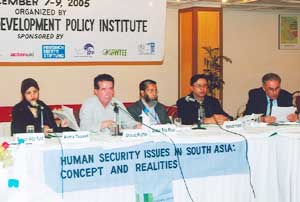Abdur Rob Khan from BIISS, Bangladesh, in his presentation State and Human Security in South Asia: Political Economy of Governance termed human development, human rights and human security as interlinked concepts and stressed that the state should be held responsible for all these concerns. He asserted that the gap between the state and the poor is widening which creates a strong sense of insecurity among the masses. He felt that in the post 9/11 scenario, the rise of extremism and an increased role of law enforcement agencies have worsened the issues of human security across the globe. He suggested the strengthening of state through a ‘true’ democracy by increasing the role of political parties, a decentralized local government system, and participation of civil society to help the state address human security concerns.
Nizamuddin Nizamani in his presentation S ocio-political Unrest and Vulnerable Human Security in Balochistan , offered a well researched picture of Balochistan. The province, despite having rich natural resources and an ideal geo-strategic location, has more than half its’ population living below poverty line and malnourished. The absence of development has isolated the province which lacks basic facilities like water, shelter, electricity, gas and telephone connections, health cover, and security for its people. Over the years, the poor policies of the governments have created a sense of deprivation amongst Balochistan’s people, leading to political unrest and instability. He cautioned that the situation is likely to further worsen if the Baloch people do not receive a reasonable share from the resources of their province. He stressed that native people must be consulted to ensure sustainable development and recommended that existing policies towards Balochistan need to be reshaped to bring harmony, peace and prosperity to this part of Pakistan.
Asma Yaqoob from the Institute of Regional Studies, Islamabad, Pakistan in her presentation Trans-boundary Waters in Jammu and Kashmir: Human Security in a Wider Context highlighted the emerging human security threats to the people of Jammu and Kashmir (J&K) as the central government of India controls most of their water resources under the Northern Grid, which is also the biggest power supply source to the state. All the Center-led hydropower stations built in J&K provide only 20 per cent electricity to the state whereas 80 per cent is supplied to other states. She clarified that the existing demand for power in the AJK State is 1,250 MW that is expected to rise to 2,563 MW in 2011-2012 whereas the estimated supply is 1,060 MW. To bridge the supply-demand gap, the state government has to either run gas turbines or buy electricity from the Northern Grid. More over, at present the Indian government is constructing six more hydropower projects on the rivers Chenab and Jehlum that are at the various stages of development. She maintained that the poor marshalling of resources, successive droughts and continued militancy have kept the state underdeveloped and complicated the human security issues. She suggested an early settlement of disputes between India and Pakistan, collective reinterpretation of Indus Water Treaty 1960, and construction of an Integrated Power Grid which might ease the situation for people living in the state.
Afrasiab Khattak, associated with the HRCP and PIPFPD, Peshawar, Pakistan, chaired the session and reiterated the consensus that human security should take precedence over all other concerns. The discussant, Mansoor Akbar Kundi from the University of Balochistan, Pakistan, declared Balochistan as the ‘neglected backyard’ of Pakistan, and Kashmir remaining in a terrible state of affairs to date.
Reported by Faisal Gorchani
Courtesy by SPDI

